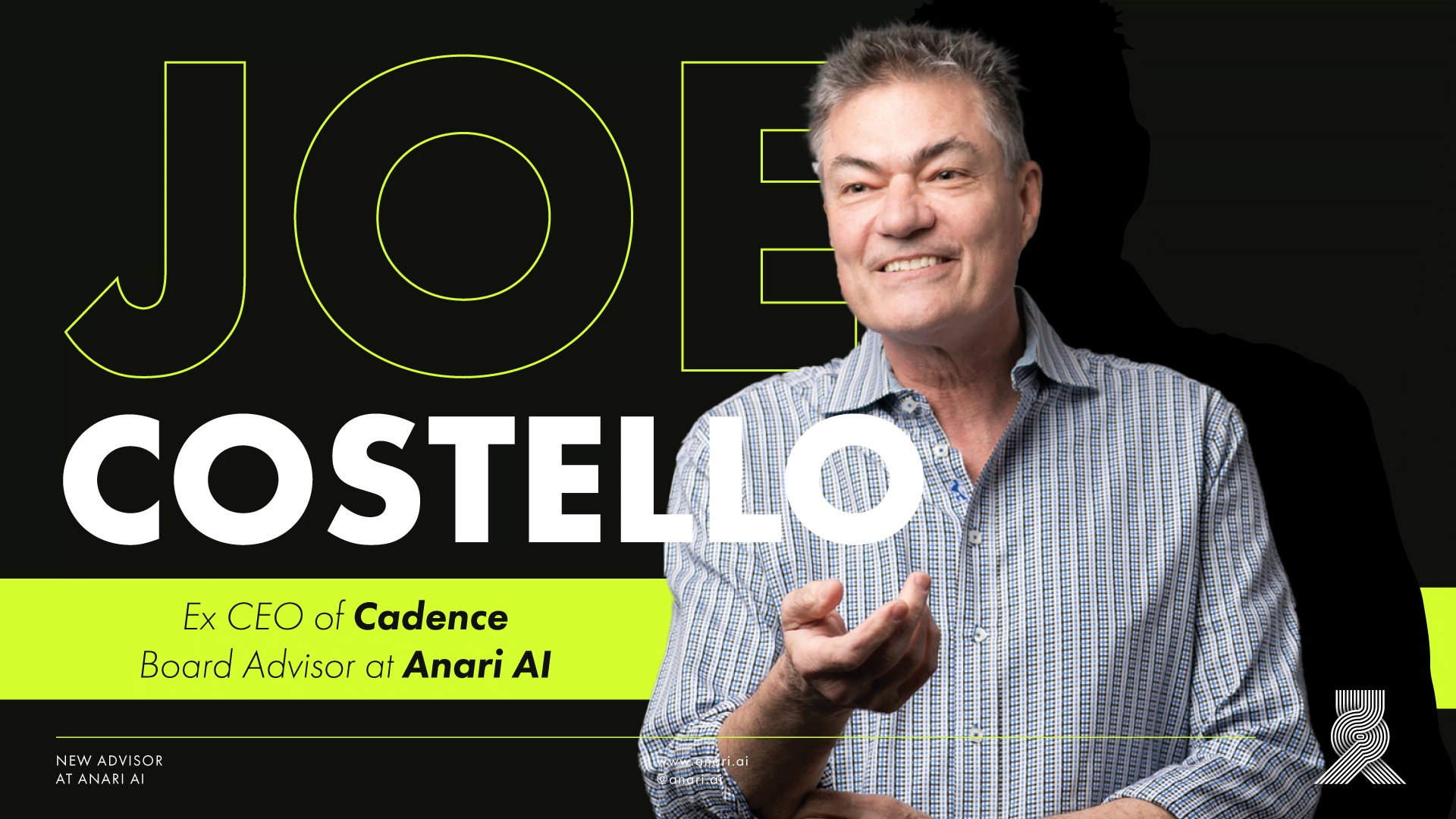
Novi Sad, May 2nd, 2022 – Joe Costello, ex-CEO of Cadence, joined Anari AI in the Board Advisor position to empower the wind of change in the hardware AI industry. Anari AI is a startup delivering the next-generation platform for computation to provide companies with personalized AI Systems accessible in one click. Anari’s global team includes experts with experience from NVIDIA, IBM, UC Berkeley, and UCLA.
“I’m honored to have someone like Joe Costello on the team to help us understand better how to build the brain and muscles for decades to come. Joe’s experience, mindset, and enthusiasm completely fit the Anari team and our vision to change from scratch the way AI computation works “, said Jovan Stojanović, co-founder and CEO of Anari AI.
What do you consider the most important macro trend that will define the future of the semiconductor industry?
Joe Costello: The semiconductor industry will continue to be the foundation of our most significant technology advances over the next few decades, but the future will be defined by different problems and constraints.
Some of the macro trends that will likely drive the industry in the next decade:
- The move from general-purpose to domain-specific compute architectures. Semiconductor companies today often have as many or more software engineers working at their companies, but despite this huge and ever-increasing investment, the software is still seen as a necessary evil/expense that must be done to get your chips sold.
- Traditionally semiconductor companies spend the least amount possible for the software and software support since they see the software as a freebie that is given away. The next decade, especially given the new domain-specific architectures, will require the boundaries between software and hardware to be eliminated and the full system solution to take the forefront for semiconductors. Systems are the perfect balance of software and hardware and semiconductor products are systems.
- Fiber/photonics is the foundation for all future high-speed communication so it is inevitable that we will see the world of photonics and electronics come together for the next generation of high-performance chips.
- From a very practical, non-technical point of view, how are we going to solve the semiconductor supply chain issues in the coming decade with the increasingly fragmented and hostile geopolitical environment? The semiconductor industry thrived and grew exponentially in a globally free economy. How will we deal with this new world and continue to make progress?
How do you see the transition from general-purpose to domain-specific architectures? Why the general-purpose solutions don’t work anymore?
Joe Costello: The Turing Lecture delivered by Professors John Hennessy and David Patterson in June of 2018 marked a clear turning point in the semiconductor industry. The previous 40 years was the era of Moore’s Law where successive generations of chips could pack more transistors on a single chip and thereby deliver ever-increasing processing power for almost all applications. But Moore’s law (and Dennard scaling for power) no longer holds and there must be a new approach to the design of chips for high-performance computing applications. Domain-specific architectures will lead the way for the semiconductor industry to continue to deliver ever-increasing power to solve the world’s biggest problems.
Why is the Cloud such a big topic in terms of creating next-generation hardware?
Joe Costello: The cloud changed the game and democratized computing. Before the cloud, only large rich companies who could afford to build enormous data centers could attack problems requiring huge compute throughput. With the cloud, a single engineer in Serbia in his/her kitchen can have access to more compute power than engineers at the largest, richest, and most powerful companies in the world. We still haven’t fully unleashed the potential of this shift. We humans haven’t yet fully digested this and exploited its full potential.
What is the role of artificial intelligence and how will it impact semiconductors in the future?
Joe Costello: AI/ML is perhaps the most important IT development of this decade (or more). The ability to make our machines learning machines that can outperform the best humans at most tasks is going to transform the world as we know it. When perhaps the greatest Go player of all time lost to Google’s DeepMind in 2017, I cried because it marked a watershed moment for human beings that I don’t think we yet comprehend. It isn’t a bad thing but it is an enormous shift that we must acknowledge and embrace. As with any other profound wave in IT, the semiconductor industry will lay the foundation for delivering on the full promise of AI/ML with generations of advancements in domain-specific architectures and the tools to build them.
Why is the context of the ecosystem so important to follow in the future?
Joe Costello: All of the greatest things that have been accomplished by human beings through the ages have been accomplished by combining the energy of large numbers of humans and human minds. Creating an ecosystem where large numbers of people can work together coherently will create far more progress than even vastly greater numbers working independently with no cohesive vision or mission. It is analogous to the difference between incandescent light and lasers. A 100-watt light bulb produces some light, but mostly heat and the incoherent light has some, but not great effect. A 100-watt laser where the light is coherent is immensely more powerful and efficient. Ecosystems are coherent human minds – they will always win.
What excites you the most about Anari AI?
Joe Costello: Anari AI has all of the right elements to change the world. The company is focused on a market opportunity that is huge and transformational. Anari is approaching the problem with a completely fresh mind and approach, unfettered by past ideology, doctrine and thinking. They are approaching the problem in the right way trying to harness the broadest set of talents to be part of the Anari revolution. And most important the team is smart, focused, passionate and with an unstoppable will to succeed.





One Comment